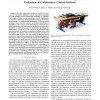Free Online Productivity Tools
i2Speak
i2Symbol
i2OCR
iTex2Img
iWeb2Print
iWeb2Shot
i2Type
iPdf2Split
iPdf2Merge
i2Bopomofo
i2Arabic
i2Style
i2Image
i2PDF
iLatex2Rtf
Sci2ools
152
click to vote
IROS
2007
IEEE
2007
IEEE
Test-environment based on a team of miniature walking robots for evaluation of collaborative control methods
— For the collaborative control of a team of robots, a set of well-suited high-level control algorithms, especially for path planning and measurement scheduling, is essential. The quality of these control algorithms can be significantly increased by considering uncertainties that arise, e.g. from noisy ents or system model abstraction, by incorporating stochastic filters into the control. To develop these kinds of algorithms and to prove their effectiveness, obviously realworld experiments with real world uncertainties are mandatory. Therefore, a test-environment for evaluating algorithms for collaborative control of a team of robots is presented. This test-environment is founded on miniature walking robots with six degrees of freedom. Their novel locomotion concept not only allows them to move in a wide variety of different motion patterns far beyond the possibilities of traditionally employed wheel-based robots, but also to handle real-world conditions like uneven ground or small...
| Added | 06 Jun 2010 |
| Updated | 06 Jun 2010 |
| Type | Conference |
| Year | 2007 |
| Where | IROS |
| Authors | Florian Weissel, Marco F. Huber, Uwe D. Hanebeck |
Comments (0)

